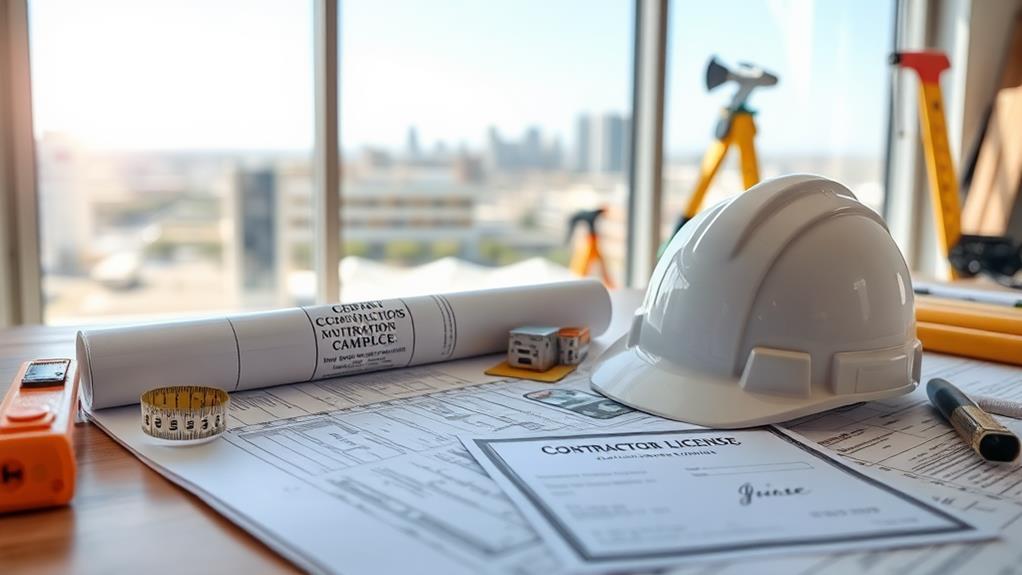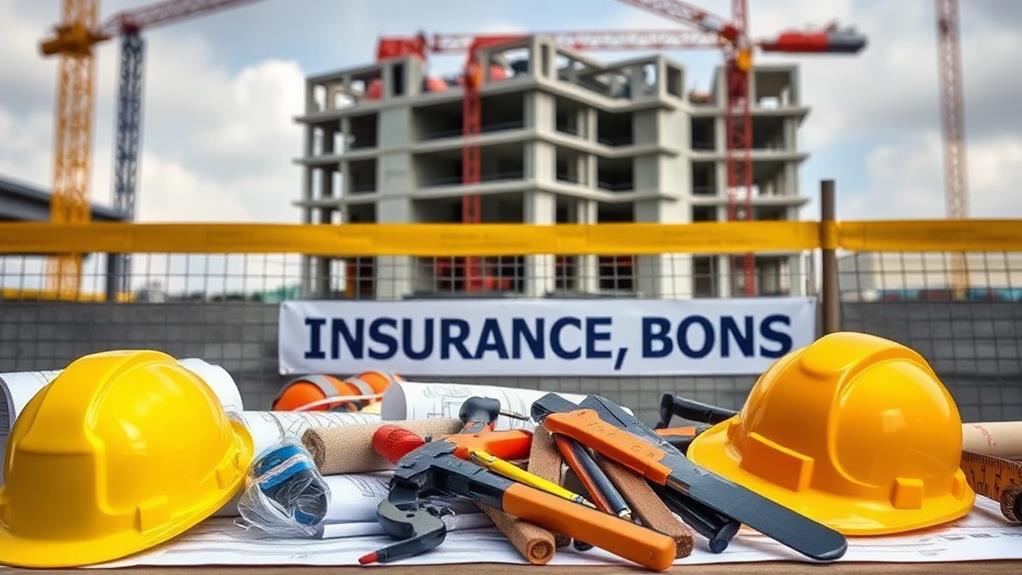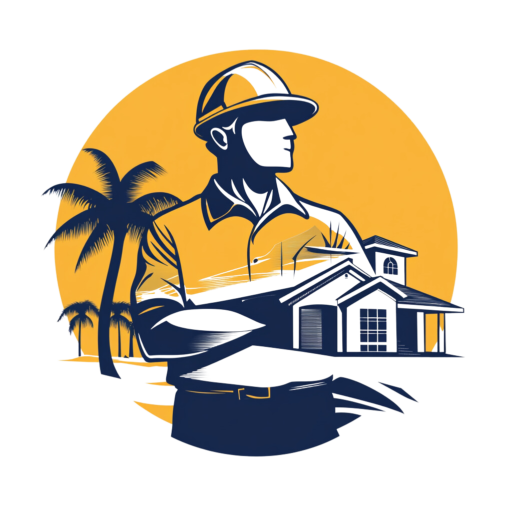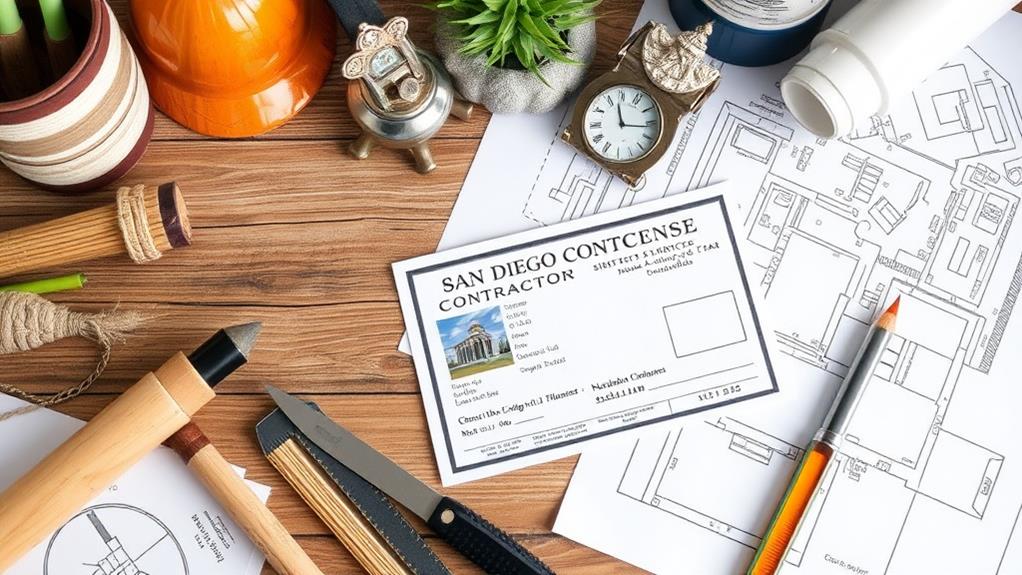In San Diego, if you want to work on projects costing over $500, you must have a contractor license from the California Contractors State License Board (CSLB). You'll need to pass a two-part exam covering law, business practices, and trade skills, and provide proof of at least four years of verifiable experience. It's vital to have both a $25,000 contractor license bond and liability insurance. There are different license classes like Class A for engineering, Class B for general building, and Class C for specialty trades. Understanding these essentials equips you for the licensing process and future ventures.
Licensing Necessity in San Diego

In San Diego, if you're planning to undertake any contracting project that costs $500 or more, obtaining a license from the California Contractors State License Board (CSLB) is vital. This guarantees that contractors comply with state regulations and uphold professional standards.
To get your contractor's license, you'll need to pass a two-part exam that tests your knowledge of law, business practices, and trade-specific skills. Your experience in your trade is significant, so you must have at least four years of verifiable experience, documented and certified by knowledgeable individuals.
Beyond passing exams and proving experience, you must also secure general liability insurance and a $25,000 contractor license bond. These protect both you and your clients, guaranteeing financial security and trustworthiness.
Additionally, local business licenses may be required to meet city regulations, so make sure to check with local authorities to remain in compliance.
Categories of Contractor Licenses
Understanding the different types of contractor licenses in California is vital for anyone looking to work in construction.
In San Diego, there are numerous projects ranging from new construction to home remodeling services, making it essential for contractors to choose the appropriate license.
You have four main categories: Class A for general engineering, Class B for general building, Class B-2 for residential remodeling, and Class C for specialty contractors like plumbers and electricians.
Each class has specific requirements and costs, so it's important to know which one fits your skills and project goals.
License Types Overview
Steering through the world of contractor licenses in California often requires a clear understanding of the four main classes available.
These classes—Class A, Class B, Class B-2, and Class C—each serve different roles in the construction and building trades. If you're aiming for a general contractor license, you'll need to know these distinctions.
Class A contractors, for example, specialize in engineering projects like highways and bridges, requiring a deep knowledge of fixed structures. Class B contractors, on the other hand, need proficiency in at least two unrelated trades, focusing on building structures.
Class B-2 is a specialized category for those involved in residential remodeling. It emphasizes skills in three unrelated trades, catering specifically to home improvement projects.
Finally, Class C pertains to specialty contractors, who focus on over 40 specialized trade areas such as electrical, plumbing, or HVAC services.
Each category under the California contractors license umbrella requires specific skills and knowledge, tailored to different aspects of construction. Understanding which class fits your expertise is vital for maneuvering the licensing process and succeeding in your chosen field.
Therefore, knowing these categories is your first step toward a successful contracting career.
Classifications and Requirements
Steering through the classifications and requirements of contractor licenses in California can seem intimidating, but it's essential for anyone looking to build a career in this field. Understanding these categories helps you find the right path for your skills and experience.
California offers four main types of contractor licenses: Class A, Class B, Class B-2, and Class C. Each has specific experience and requirements you'll need to meet.
A Class A license is for General Engineering Contractors. This requires a strong foundation in engineering knowledge, focusing on fixed works like bridges or highways.
If you're aiming for broader projects that involve at least two unrelated trades, the Class B (General Building Contractors) license might be your target. For those interested in residential remodeling, the Class B-2 license is ideal, as it requires experience in three unrelated trades for residential projects.
Class C licenses are for Specialty Contractors, covering over 40 categories like electrical, plumbing, and HVAC work.
No matter the classification, you must be at least 18 years old and have at least four years of verifiable experience in your chosen area within the last ten years. Understanding these classifications is vital for your contractor journey in California.
Application Costs Breakdown
Steering through the costs associated with obtaining a contractor license in California can be an important step in your professional journey.
First, you'll encounter a non-refundable application fee of $450. This fee guarantees your application is processed, but if you don't meet the requirements, you won't get this money back.
Once you pass the exam, you'll need to pay an initial license fee of $200 to receive your license.
A mandatory step in this process is securing a $25,000 contractor license bond. This bond, which increased from $15,000 as of January 2023, helps protect your clients financially.
Additionally, you might face extra costs for exam preparation materials, ranging from $295 to $595, depending on your study preferences.
Active contractor licenses aren't permanent—you must renew them every two years. This requires a renewal application fee of $450 to keep your license valid and active.
Planning for these costs is important, as they represent the financial commitment required to maintain your status as a licensed contractor. Understanding these expenses guarantees you're well-prepared for each step of becoming and staying a licensed contractor in California.
Basic Licensing Requirements

To secure a contractor's license in San Diego, you need to meet several key requirements, starting with being at least 18 years old and having four years of verifiable experience in your trade.
You'll also have to pass a two-part exam that covers both general business laws and specific trade skills, ensuring you're prepared for the job.
Additionally, obtaining a $25,000 surety bond is essential, as it protects clients from potential construction defects and shows you're serious about your responsibilities.
Age and Experience Criteria
Obtaining a contractor license in San Diego requires meeting specific age and experience criteria that guarantee competence in the field. First, you must be at least 18 years old and present valid identification. Additionally, the state requires a minimum of four years of verifiable experience in construction management or a related field within the last ten years. This experience must be validated by knowledgeable individuals who can attest to your skills and proficiency in the trade, ensuring you have the necessary practical know-how.
If you have educational credits, they can help reduce the required experience. For example, an Associate's degree may count for up to 1.5 years, while completing an accredited apprenticeship program can reduce it by up to three years. This makes it easier for those with educational backgrounds to meet the experience requirements sooner.
For business entities like corporations or LLCs, it's important to have a designated qualifying individual with the necessary experience. This person will act on behalf of the company when applying for a contractor license.
Bonding and Insurance Obligations
As you prepare to meet the age and experience criteria, it's equally important to address the bonding and insurance obligations required for a contractor license in San Diego. To protect consumers against defective construction claims, you'll need a $25,000 bond. This requirement recently increased from $15,000 in January 2023. The bond acts as a financial safeguard, guaranteeing that consumers and employees are protected if issues arise.
In addition to the bond, liability insurance might be necessary, depending on your specific license type and the nature of your work. Both the bond and insurance documentation must be submitted to the Contractors State License Board (CSLB) before you can obtain a contractor's license. Without proof of bonding and insurance, your contractor license application may be denied, which could delay your plans.
As a qualifying individual for a contractor's license, you'll also need to meet the $25,000 bond requirement. This guarantees consistent consumer protection across all relevant parties.
Properly managing these bonding and insurance obligations is vital for a successful application process. By staying organized and gathering the necessary documents, you can smoothly navigate the requirements and focus on building your contracting career.
Examination and Application Process
Securing a contractor's license in San Diego involves maneuvering a structured examination and application process. First, you need to submit an application to the Contractors State License Board (CSLB) with a non-refundable fee of $450. This step sets the stage for your journey to becoming a licensed contractor.
You must prove at least four years of verifiable experience in your trade from the last ten years. Someone knowledgeable must certify this experience, ensuring you've got the skills needed for the job.
Once your application is in, prepare for the contractor license exam. This examination is split into two parts: a Law and Business section and a trade-specific section. If you've had a valid license before, you might get a waiver for the trade section.
Background checks are part of the process, including fingerprinting, and you've got to disclose any past legal issues.
After passing the exam, you're almost there. You'll need to provide proof of a $25,000 bond and any necessary insurance documents. Without these, your license can't be issued.
With these steps completed, you'll be on your way to a successful contracting career.
Application Submission Steps
When you're ready to apply for a contractor license in San Diego, start by selecting the appropriate application form that matches your business entity type, whether it's a sole proprietorship, partnership, or corporation.
These application submission steps are vital for obtaining your contractor license in California. Submit your application to the Contractors State License Board (CSLB) along with a non-refundable application fee of $300.
Your experience must include at least four years of journey-level work in the relevant trade. Make certain this is certified by a knowledgeable individual.
Once your application is approved, you'll need to pass both the Law and Business examination and a specific trade examination. These exams are 3.5 hours long, multiple-choice format, and essential to becoming a licensed contractor.
After successfully passing the exams, you must submit proof of a $25,000 bond or cash deposit to the CSLB. This step is part of maintaining compliance with state licensing requirements.
Additionally, make sure you get any necessary local permits or licenses specific to operating in San Diego. By following these steps carefully, you'll be on your way to securing your contractor license and starting your business legally and efficiently.
Criminal Background Checks

Steering the process of obtaining a contractor's license in San Diego involves more than just paperwork and exams; you'll also need to undergo a mandatory criminal background check.
The Contractors State License Board (CSLB) requires all applicants to complete these mandatory background checks, which include fingerprinting to assess criminal history. This step guarantees that only qualified individuals are granted the responsibility of operating as contractors.
When filling out your license application, it's important to disclose any past legal issues, including prior licensing issues.
The CSLB reviews your disclosed criminal history to determine your eligibility. Don't worry, though—not all convictions automatically disqualify you from licensure.
The CSLB considers any rehabilitation efforts you've made, which means that if you've worked hard to improve your situation, you might still qualify for a license.
Exam Preparation and Passing
To successfully tackle the California Contractor Licensing Exam, you'll need to focus on both the Law & Business and trade-specific sections.
Various study resources, like online courses, live streaming classes, and home study options, can help you grasp key topics and strategies for effective preparation.
With a 98% first-attempt pass rate from programs like Contractors Intelligence School, you're in good hands to pass the exam confidently.
Study Resources Available
Preparing for the San Diego contractor license exam doesn't have to be intimidating, thanks to a variety of study resources tailored to fit different learning styles and budgets.
You've got several study options for exam preparation. Full online courses are available for $495, live streaming classes for $595, and traditional home study programs for $295. These programs cover both the Law & Business and trade-specific sections, boasting a 98% success rate for first-time test-takers—the highest among California contractor license schools.
The Contractors Intelligence School offers an extensive prep program at $695, discounted from $1,200, and includes the first-year contractor license bond coverage. They also provide a 100% money-back guarantee if you don't pass the exam, giving you peace of mind.
You can track your study progress with an intelligent tracker, ensuring you're on the right path. Flexibility is key, and you can study on over 8,000 devices, using video streaming, audio listening, and practice exams to suit your learning style.
With these resources, you're well-equipped to tackle the exam confidently and efficiently, setting you on the path to success in the contracting field.
Key Exam Topics
Steering through the California Contractor Licensing Exam, you'll encounter two essential sections that demand your attention: the Law and Business portion and a trade-specific part tailored to your chosen license type.
First, you must focus on the Law and Business section, which covers state-specific regulations and business practices. This part is mandatory for everyone aiming to secure a Contractors License.
To qualify for the exam, the qualifying individual must have at least four years of verifiable experience in their trade within the last ten years. This experience guarantees you have the necessary knowledge and skills to tackle the topics you'll face.
The exam itself is a multiple-choice format, lasting about 3.5 hours per section, so thorough exam preparation is critical.
The Contractors State License Board (CSLB) offers a variety of study materials to help you prepare. Many contractor schools also provide resources, often with money-back guarantees for those who don't pass on their first try.
Successfully completing the exam is an essential step in the contractor licensing process, allowing you to legally engage in contracts exceeding $500 in project costs.
With dedication and preparation, you can confidently navigate this important milestone.
Effective Preparation Strategies
How can you effectively prepare for the California Contractor Licensing Exam to guarantee you pass on your first try? Enroll in a thorough exam preparation course, like the full online option for $495.
This course provides structured study materials that are specifically designed for the California Contractor Licensing Exam. You'll find these materials essential for covering both the Law and Business exam and the specific trade exam.
Take advantage of practice exams included in the course. These will help you become familiar with the exam format and increase your chances of achieving a passing score.
To track your study progress, use the intelligent tracker feature available in many prep programs. This tool guarantees you're effectively covering all necessary topics.
Consider attending live streaming classes or traditional in-class sessions. They offer real-time interaction with instructors and peers, enhancing your understanding of complex topics.
Bond and Insurance Needs

Understanding the bond and insurance requirements is fundamental for any contractor looking to operate in San Diego. You need to submit a $25,000 bond to the Contractors State License Board (CSLB) before obtaining your license. This bond acts as a safeguard, protecting consumers from defective construction claims.
General liability insurance is another significant requirement. It covers third-party bodily injury and property damage, offering financial protection during construction projects. If you have employees, workers' compensation insurance is mandatory. It provides coverage for any work-related injuries or illnesses your employees might face.
Beyond these, you might want to take into account tools and equipment insurance. This type of insurance helps cover repair or replacement costs for any tools that might be damaged or stolen while you're working.
Before you start any construction project, it's essential to have proof of insurance and bonding. This guarantees you're following local regulations and meeting client expectations.
These steps not only protect your business but also build trust with your clients. By securing the right bond and insurance, you're prepared to handle the unexpected and focus on delivering quality work.
License Exemptions and Penalties
While securing the right bond and insurance is essential for operating legally, it's equally important to know when a contractor's license isn't required. Understanding license exemptions can save you time and effort.
In California, if you're tackling projects with total costs under $500, you can handle these small repairs and maintenance tasks without needing a contractor's license. Employees paid wages, without independent control over their work, are also exempt from contractor licensing requirements. Additionally, public personnel on public projects and court officers in their official capacities don't need licenses.
Owner-builders have some flexibility too. If you're an owner-builder improving your own property and using your own employees, you can proceed without a license as long as you avoid contracting practices.
But beware, contracting without a license can lead to serious penalties. First offenses might bring misdemeanor charges, which could mean up to six months in jail and/or a $500 fine. Plus, administrative fines can range from $200 to $15,000.
Knowing these rules helps you avoid penalties and guarantees that your contracting activities remain within legal boundaries. So, always check if a license is needed before starting a project.
Role of Qualifying Individuals

Qualifying individuals often play an essential role in maintaining the validity of a contractor license, especially during ownership changes. In California, a qualifying individual guarantees that a construction business complies with legal standards. This role requires at least four years of verifiable experience in the relevant classification within the last ten years. Such experience must be certified by knowledgeable individuals, guaranteeing that the licensed contractor is well-versed in the field.
As a qualifying individual, you must work at least 32 hours a week as a bona fide employee to maintain the license status. This commitment guarantees that the business operates smoothly and adheres to all legal requirements.
A qualifying individual can be associated with multiple licenses if there's common ownership, meaning you must own at least 20% equity in each business involved.
Eligibility requirements vary depending on whether you're dealing with individual license holders, partnerships, corporations, or LLCs. Each has specific rules about who can act as the qualifier.
License Ownership Changes
When it comes to maintaining a contractor license in California, the role of a qualifying individual is just the beginning. Guiding license ownership changes requires careful attention to guarantee compliance. Here's what you need to know:
- Automatic Transfers: Business ownership changes don't automatically transfer licenses, except for corporations where ownership remains unchanged. It's vital to understand this to avoid issues with license validity.
- Designating a Qualifier: After ownership changes, you must designate a qualifying individual to keep your license valid. This guarantees compliance with the Contractors State License Board (CSLB) regulations. If a qualifying individual disassociates, promptly appoint a new one with proper experience documentation.
- Multiple Licenses: A qualifying individual can serve multiple licenses if there's common ownership of at least 20% equity in up to three firms within a year. This flexibility helps in managing different business entities.
- Reporting Changes: Any changes in company personnel, business name, address, or type must be reported to the CSLB within 90 days. Timely reporting is essential to maintain compliance and guarantee your license's validity.
Conclusion
Getting a contractor's license in San Diego is vital if you want to build or fix things legally and professionally. You need to know the types of licenses, meet the basic requirements, and follow the application steps, kind of like assembling the pieces of a Rubik's Cube. Don't forget about background checks, bonds, and insurance. If rules aren't followed, penalties can be hefty. Understanding these essentials will help you navigate the process smoothly and successfully.


Leave a Reply